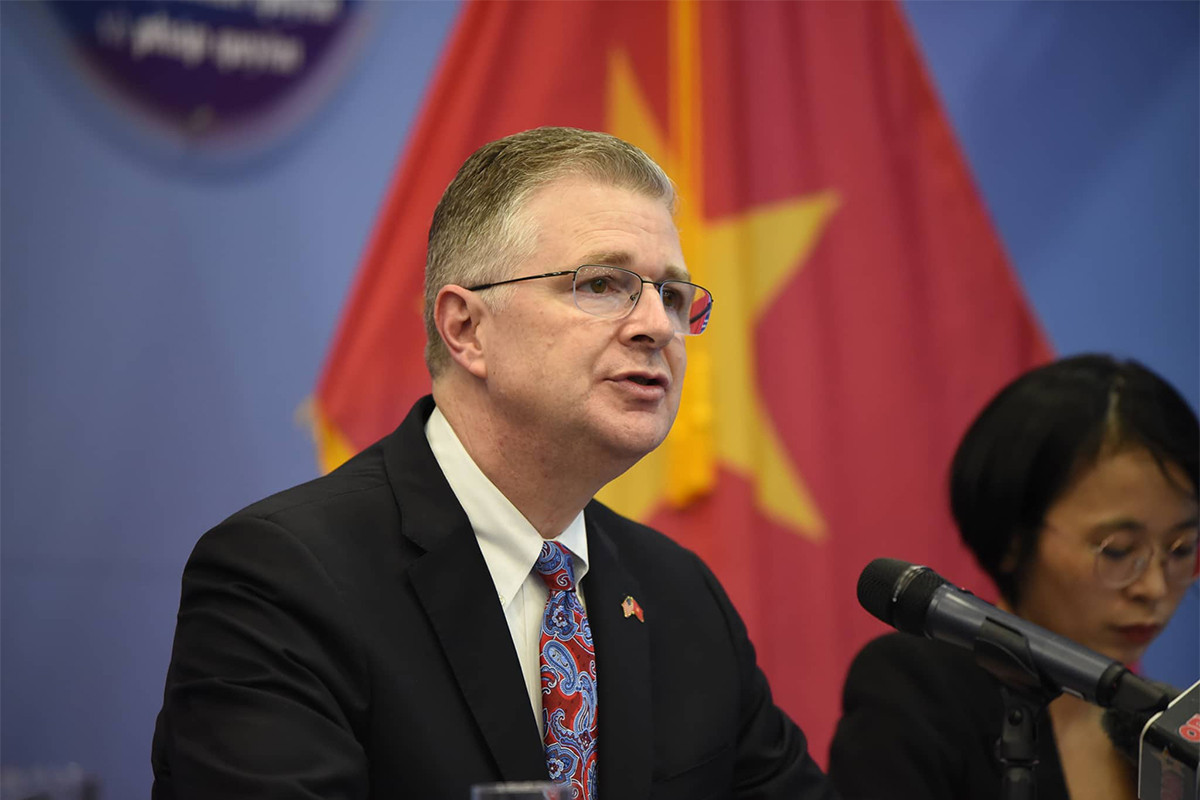
Kritenbrink is a former US Ambassador to Vietnam.
“I am back in Hanoi, the wonderful city where my family once lived. I have met a lot of old friends,” he said.
He said over the last two days, he had met the Head of the Party Central Committee's Foreign Affairs Committee Le Hoai Trung, Permanent Deputy Minister of Foreign Affairs Nguyen Minh Vu, Deputy Defense Minister Hoang Xuan Chien and Deputy Minister of Public Security Le Quoc Hung.
He also attended a conference on climate change and exchanged views with representatives of enterprises in Hanoi. At the Diplomatic Academy of Vietnam, he delivered a speech on US views on Indo-Pacific strategy.
He stressed that Vietnam plays a central role in the US’s Indo-Pacific strategy, which aims to build collective capacity of like-minded alliances, partners and friends, and promote mutual interests as well as a rule-based international order.
“We do this so that all parties can cooperate with each other to build a free, open and connected region with security, prosperity and resilience. I can say that the comprehensive partnership between the US and Vietnam is stronger than ever. The US attaches great importance to the bilateral relationship. Our two nations have a common view on a rule-based order in the Indo-Pacific. This acts as the foundation for the security and prosperity in the region,” he said.
Kritenbrink affirmed that under the Indo-Pacific strategy, Washington is working to improve the capability of its partners in the region and maritime capacity; ensuring that conflicts in the region are solved peacefully, based on international laws; and ensuring that maritime statements on the basis of international laws are enforced.
Vietnam's joining of the IPEF (Indo-Pacific Economic Framework) was "positive and constructive".
He said the US has high hopes for constructive relations to bring practical benefits to people all over the region in the digital economy, supply chains, clean energy transformation, and infrastructure investment.
He said that many activities will be promoted for the 10th anniversary of the Vietnam-US comprehensive relations.
“We wish to promote cooperation with partners and friends in Vietnam so as to upgrade the relationship between the two countries to a new height. I believe the two countries will continue to consolidate and strengthen relations to grasp common opportunities and work together to solve common challenges,” he said.
He said he hopes that the construction of the new headquarters of the US Embassy in Hanoi will begin next year and the new Vietnamese Embassy in Washington DC will become operational. These are two important events to occur concurrently, which will symbolize the bilateral partnership.
Kritenbrink congratulated Vietnam for being elected to the UN Human Rights Council of the 2023-2025 term, stressing that the issue of human rights will continue to act as a central pillar in the US foreign policy.
“We congratulate Vietnam on being elected to the UN Human Rights Council. We hope that as an important member of the UN Human Rights Council, Vietnam will cooperate with us in promoting human rights. We also hope that Vietnam will be a partner of the US in addressing serious human rights challenges in the world," he said, adding that he has had the opportunity to exchange views on human rights issues within the framework of a working visit to Vietnam under the spirit of frankness and mutual respect.
US Ambassador to Vietnam Marc Knapper spoke about the changes "as clear as day" about the life and livelihood of Vietnamese, especially in three fields – healthcare, climate change and infrastructure.
Regarding healthcare, Knapper said Vietnam-US cooperation in the field began 15 years ago, when PEPFAR (The United States President's Emergency Plan for AIDS Relief) kicked off to help Vietnam prevent and control HIV/AIDS.
Vietnam was the first Asian country joining the program. And now, cooperation in the healthcare sector is one of the pillars in US-Vietnam relations.
He noted the commitments by the government of Vietnam not only at the central level, but also at the local level in dealing with HIV/AIDS, tuberculosis, and most recently Covid-19.
Regarding climate change, the US Ambassador noted Prime Minister Pham Minh Chinh’s commitment on reducing net emissions to zero percent by 2050. After the commitment, local leaders have been making every effort to protect life and livelihood of people, and promote the switch to clean energy.
“Fifteen years ago, it took me four to five hours to go to Ha Long on a tough road with just two lanes. But now I only spend two hours on a 6-lane highway,” he said.
“Vietnam’s infrastructure development can be seen in the upgrading and expanding of roads and airports, including in remote areas such as Northwest and Central Highlands. This promotes the development of economy and tourism, attracts investments, and brings benefits to people's lives and livelihoods,” he said.
Thai An